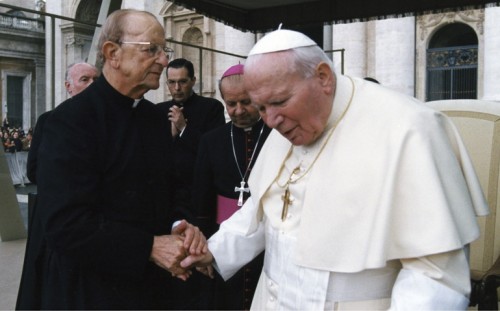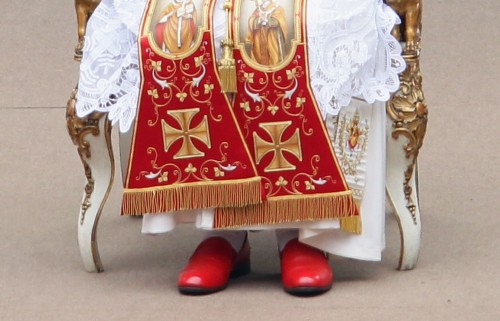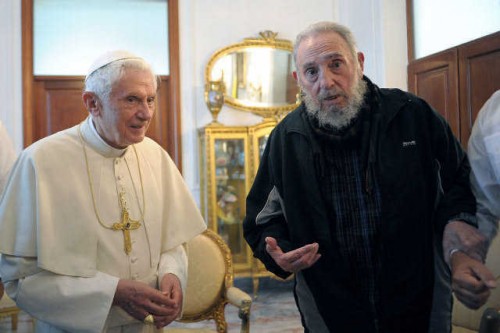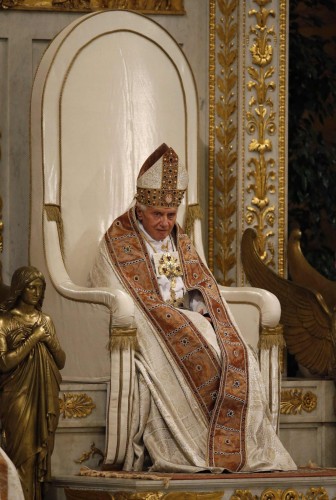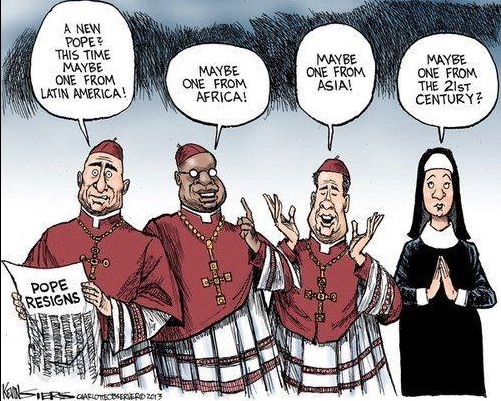By Jason Berry
Newly released documents in a Rhode Island lawsuit show that the scandal-tarred Legion of Christ shielded information on their founder’s sex life from a wealthy widow who donated $30 million over two decades.
In 2009, the widow’s niece, Mary Lou Dauray, sued the Legion and the bank that facilitated key transactions, alleging fraud. At Dauray’s request, backed by a motion from NCR and three other media outlets, Superior Court Judge Michael Silverstein revoked a protective order the Legionaries had secured and released discovery findings Friday.
The thousands of pages of testimony, financial and religious records open a rare view into the Legion culture shaped by its Mexican-born founder, Fr. Marcial Maciel Degollado.
Maciel built a power base in Rome as the greatest fundraiser of the modern church. He won the undying support of Pope John Paul II, who called him an “efficacious guide to youth” and praised Maciel in lavish ceremonies even after a 1998 canon law case at the Vatican in which the cleric was accused of sexually abusing Legion seminarians.
The Vatican is not a defendant in Rhode Island, but decisions by John Paul and Pope Benedict XVI permeate a larger story rising from the files.
A key strand in the new material aligns with an admission by Cardinal Franc Rodé, who told NCR and Global Post in a recent interview that “in late 2004 or early 2005” he saw a videotape of Maciel “with a mother and child represented as his.” A Legionary, whom Rodé did not identify, showed him a tape of Maciel with a girl identified as his daughter.
The cardinal did not confront Maciel about paternity, but says he told a Vatican canon lawyer who was under orders from Cardinal Joseph Ratzinger, then head of the Congregation for the Doctrine of the Faith, to investigate the pedophilia accusations. On that front, Ratzinger, as Pope Benedict, dismissed Maciel from ministry in May 2006, but the Vatican communiqué did not specify why or acknowledge the victims. Those explanations only came in 2010, after a Vatican investigation of the Legion prompted by news reports of the order’s disclosure that Maciel had a daughter, a fact the Vatican had known since 2005.
Two sons by a second woman, with whom Maciel had a longstanding relationship, came forward later.
The Rhode Island documents, coming less than a week after Benedict announced his resignation from the papacy, add another chapter to the scandals that apparently were on his mind when, in his final public Mass as pope, he spoke of the face of the church that “is, at times, disfigured.”
Fluent in French, Gabrielle Mee was conservative and refined; she felt she had found a spiritual home with the ultra-orthodox Legionaries for her twilight years. She became a consecrated woman in the order’s lay group, Regnum Christi, living in a religious home while steadily ceding her enormous wealth to the Legion by giving power of attorney to Fr. Anthony Bannon, an Irish-born Legionary who divided his time between Connecticut and Rhode Island.
Like everyone else in the order’s closed environment, Mee was taught that Nuestro Padre, as Maciel was called, had his enemies, but that he was a living saint for his leadership as an evangelist, drawing the church back from liberal abuses of the Second Vatican Council and attracting young men to a strict religious life. That was the Legion message.
By all accounts, she believed that message until her death at 96 in May 2008, just four months after Maciel’s funeral in Mexico. She never knew Maciel had sired three children, two of whom, as previously reported in NCR, he secreted into private papal Masses celebrated by an apparently clueless John Paul.
At his death, the Legion website announced that Maciel had gone to heaven. Yet at that very time, Fr. Luis Garza and other top Legionaries were scrambling to decide how, and when, to reveal that Maciel had a grown daughter — a fact the Vatican had known for three years.
Mee had long embraced the Legion’s public campaign against nine men who in 1997 accused Maciel of abusing them as seminarians. This is referenced in a bank document.
Mee’s husband, Timothy, was on the board of trustees of Fleet Bank. By the time he died in 1985, he had established a charitable trust in his name and a separate trust for Gabrielle. Three years later, she gave her first donation of $1 million to the Legion after her close friend Marguerite Garrahy, a former first lady of Rhode Island, spoke favorably of the Legion. Mee and Garrahy attended daily Mass together.
Bannon immediately notified Maciel in Rome of the million-dollar gift. But, he insisted in a deposition, “I did not control her checkbook.”
Maciel made a practice in Mexico of cultivating wealthy widows and the wives of wealthy men. The Legion prep schools catered to affluent families, recruiting parents to Regnum Christi. The schools fed young men into the Legion. Bannon, referring to Mee, also testified on how Regnum Christi and Legion members donate their own assets to the order:
She would assign the management of those assets to somebody she trusts, and then before taking her final commitment would decide what is to be done with those assets. When there are assets that come as an inheritance, the same. … It’s my belief in the premise, and the way I’ve always acted is a person’s assets is something God has given to him through family or through their own good work, and they are the owners and managers of that, and it’s up to them to see what God wants them to do with the money.
I always speak to them about the needs that we have, but always respect their decision.
Troubles emerge
A bank memo suggests Bannon acted with greater self-interest when the order was threatened.
On Feb. 23, 1997, Gerald Renner and this writer published an investigative report in the Hartford Courant detailing a long history of sexual abuse by Maciel based on lengthy on-the-record accounts by nine former seminarians or ex-Legion priests. Maciel refused to be interviewed but claimed innocence. The Vatican refused any comment.
The Legion at the time had several major accounts with Fleet Bank and a mortgage on a former IBM complex in Thornwood, N.Y. It had plans to establish a college that involved zoning issues that were drawing strong resistance from Westchester County residents. The Legion purchased the property for $33 million in January 1997 with major help from Mee and carried a mortgage balance at the time of almost $25 million.
Prior to the Courant publication, the Legion sent affidavits of Maciel supporters to the newspaper, purporting to show Maciel’s innocence in the face of a conspiratorial effort by the men to defame him.
Meanwhile, Garza, the order’s vicar general, traveled to Legion houses in several countries to warn of the forthcoming article, claiming it would be based on lies and telling Legionaries and Regnum Christi members not to read the report should they see a copy.
Legionaries took a special vow never to criticize the founder, or superiors, and to report on anyone who did. This “special vow” — which Benedict abolished many years later — protected Maciel from criticism and rewarded spying as an act of faith.
In this environment, five days after the article was published, Bannon and another Legionary met with two Fleet officials at the bank. A summary memo from a bank official explains:
We discussed the Legion’s public relations strategy and we will all follow any further developments in the news media.
We determined the most effective way to measure the health of the Legion’s fundraising stream and cash flow on a real time basis was to monitor monthly cash flows to determine whether there has been any fall-off in revenues.
The memo states that Bannon asked Fleet to write a letter to the Courant “to complain about the story.” The bank never did.
The memo continues:
In terms of additional credit concerns the Legion was concerned about the impact of the surprise on Fleet. Father Bannon offered to pledge the cash flow stream from the Mee trust funds in order to provide additional security in this uncertain period. I thanked him, but communicated that it would be a significant conflict of interest if we were to seek a perfected security interest in the Mee funds because we are also a trustee [for Gabrielle Mee and for the Timothy Mee Charitable Trust].
“There is no evidence that Mrs. Mee knew of the detailed allegations against Maciel nor the existence of the Hartford Courant article,” plaintiff attorney Bernard Jackvony told NCR. “Rather, it shows that she was in the dark.”
Regnum Christi posted a notice in its residences saying that Nuestro Padre was under attack in a false article. But that, it appears, is the extent of what Mee knew.
“She was totally unaware that the Legion was using her wealth as a negotiating tool with the bank,” Jackvony said. “It shows how the Legion at that point essentially treated her money as theirs. They took such liberties with her funds without her even knowing, and treating [it] like they were entitled to it.”
In 2001, Bannon obtained sweeping power of attorney, drafted by the Legion’s lawyers, for Mee’s affairs. The Legion sued Fleet to obtain greater access to the combined Mee funds, with Gabrielle testifying for the Legion. The two sides settled out of court. Fleet later merged with Bank of America. Because of the 2001 agreement, Dauray’s lawsuit includes the bank as a defendant with the Legion on allegations of fraud.
Just how many Legionaries knew of Maciel’s secret life — or how Maciel funded it through the coffers of a religious charity — is unclear from an initial review of the documents. But Maciel was drawing $20,000 a month from the Legion in his later years, according to the transcript of a speech by Garza, the longtime vicar general, to a Regnum Christi group in Monterrey, Mexico, after the Legion divulged existence of the daughter in 2009.
Garza’s speech was not evidence in the lawsuit, nor was he questioned about it. A Legion spokesman told NCR he could not respond to questions.
Garza’s testimony is a pivotal part of the legal action. As vicar general, he was Maciel’s second in command and “responsible for overseeing key areas of logistical governance,” according a Regnum Christi profile, “involving constant analysis of numbers and personnel, structures and organizations, risks and opportunities.”
Garza grew up with five siblings in Monterrey, a scion of one of Latin America’s wealthiest families, often compared to the Rockefellers.
Maciel cultivated the Garza family for years, ingratiating himself with the parents. Three of the siblings became immersed in Regnum Christi; the other half reacted against Maciel’s tactics.
“Our family is hopelessly split to this day,” said Roberta Garza, the youngest sibling. “One of my aunts gave Maciel a house.”
A 1978 graduate of Stanford with a degree in engineering, Luis Garza joined the Legion after a period in Regnum Christi. The family made huge donations over the years, with Luis reported by one former Legionary as donating several million of his own. He earned a canon law degree from the Jesuits’ Pontifical Gregorian University in Rome. Maciel named him vicar general as a sign of his rising authority.
In 1989, Mee went to Rome and met with Maciel to see the progress of the Legion seminary being built with her generous help.
Jackvony, a former Republican lieutenant governor of Rhode Island, asked Garza in deposition: “Were you aware of a gift [Mee] made to the Legion in 1989 of a million dollars?”
“No, I was not aware.”
“Did you ever become aware of that in your official duties?”
“No.”
“Did you become aware of it later?”
“I don’t remember.”
Jackvony bore down: “In 2002, there were a total of four million dollars in gifts, including a condominium in Narragansett?”
“The only thing I know about this is it’s a condominium.”
“In 2003,” Jackvony continued, “there were gifts totaling about $3,600,000. Are you aware of any of those gifts?”
“No.”
In contrast, Fr. Stephen Fichter, chief financial officer for the Legion in the late 1990s, gave often detailed answers despite 11 years’ distance. Fichter left the order in 2000, uneasy with the internal rigidity, yet believing then Maciel was innocent of the seminarians’ accusations. In 1997, before the Hartford Courant investigation profiled nine ex-Legionaries recounting how Maciel abused them as boys, Garza had traveled to Legion houses in three continents, telling Legionaries and Regnum Christi members that certain accusations soon to be published were lies and none of them should read the media account if they came across it. Computer access was tightly limited in those years.
Fichter joined the Newark, N.J., archdiocese and earned a doctorate in sociology. He divides his time as a New Jersey pastor and in a research position at Georgetown University’s Center for Applied Research in the Apostolate in Washington.
“While I firmly believe that God can write straight with crooked lines, and that he brought some good into my personal life through the Legion,” Fichter testified, “I personally feel deceived, defrauded, lied to” by the scope of information on Maciel that surfaced by 2011.
Fichter recalled reviewing Gabrielle Mee’s bank investment files in Rome and storing her donation records “in paper form in some filing cabinet.”
Maciel drew money in a manner “totally inconsistent” with ordinary Legionaries. “I would always have to give him $10,000 in cash; 5,000 in American dollars and 5,000 equivalent in currency to the country he was traveling,” Fichter said. “I do not know what he used that money for. He never gave an accounting of that money.”
“Rhode Island’s attorney general [Peter Kilmartin] has the right to intervene in our case because it involves a charitable trust,” Jackvony said. “The fraud by Maciel and the Legion of Christ demonstrated in these documents also deserves immediate attention to determine whether laws against financial abuse of the elderly have been violated.”
Maciel hid his pathological sex life behind a wall of wealth and an image of militant orthodoxy, charming John Paul II. He capitalized on footage of a beaming pope, celebrating Maciel and his cheering Legionaries at a public audience. A 30-person fundraising office at the Legion’s U.S. headquarters in Cheshire, Conn., marketed cassettes of the event as a pivotal item in the Legion fundraising. A scene of John Paul embracing Maciel at the altar dramatized his standing for wealthy benefactors, like Mee.
By 2004, the Legion had a $650 million budget and $1 billion in assets for the prep schools, seminaries and universities in Latin America, Europe and North America. In 2005, with John Paul’s death, Ratzinger broke with the pope’s resistance to prosecuting Maciel and ordered Vatican canon lawyer Msgr. Charles Scicluna to investigate. Scicluna worked at Congregation for the Doctrine of the Faith, which is housed in the majestic palazzo called the Holy Office where Galileo was convicted of heresy. The upper floors house certain Roman Curia officials, including Rodé, 78, now retired as the prefect of the Congregation for Institutes of Consecrated Life and Societies of Apostolic Life.
A secret safe
In 2004, Rodé became prefect of the congregation that governs religious orders. His predecessor, Cardinal Eduardo Martínez Somalo, took a $90,000 gift from Maciel, according to the priest who carried the envelope. Martínez Somalo refused interview requests.
Rodé said he took no cash gifts from the Legion.
“I esteem the charism of the Legionaries,” Rodé told NCR in a Nov. 29 interview at his apartment at the Vatican. He saw young men of rock-solid orthodoxy, their numbers rising in Latin America as vocations sank in Europe and North America. Rodé gave celebratory speeches for the Legion in Brazil and Chile and praised the founder after Maciel’s ouster.
Asked whether that was a mistake, he couched his answer in the context of papal loyalty. “It is difficult to say it was a mistake by the pope,” he said, referencing John Paul’s praise of Maciel long after the 1998 case filed in the doctrinal congregation. “I don’t know. I wasn’t there” to know what John Paul knew, or would not consider, about Maciel.
Rodé defends the Legionaries as a phenomenon apart from Maciel, a position Benedict took in the Vatican takeover to reform the order.
A former Legion priest, speaking on background, said he met with Rodé after Maciel’s death and the cardinal told him of a VHS he had seen when Maciel was superior general of Maciel and his young daughter.
Asked about this, Rodé gave a somber nod, saying it was “late 2004, or early 2005.” The Legionary who showed it wanted him to have the information before the order’s election for superior general, the position Maciel held for decades. Rodé says he persuaded the 84-year-old Maciel, by then under investigation, to step down. Maciel was re-elected and then retired.
What did Rodé do about the videotape showing Maciel’s daughter?
“I told Msgr. Scicluna all about the problem,” the cardinal said.
Scicluna reported directly to Ratzinger.
As the prefect over religious orders, why did Rodé not punish Maciel?
“It was not for me to pronounce the penalty,” he said. “But he was, in the end, corrected” — by Benedict’s 2006 Vatican order sending Maciel to a “life of prayer and penitence.”
Did the cardinal confront Maciel about his child?
“It was not my obligation.”
Why not?
“I was not his confessor.” Rodé paused. “It was my obligation as prefect for religious to get him to step down, and I did.”
The cardinal’s interview lends validity to another dimension of Garza’s testimony: his mounting suspicions about Maciel having a child and what it took for him to confirm it. This occurred almost two years after another Legionary showed Rodé the videotape.
By 2005, Maciel was showing “basic evidence of dementia, like forgetting things, repeating things in a conversation,” Garza stated in his Rhode Island testimony.
After he stepped down as superior general, Maciel left Rome and began traveling. He spent time that spring in his birthplace, Cotija de la Paz, Mexico, where the Legion has a religious house. Photographs of a reunion with his former paramour, Norma Hilda Baños, and their daughter, Normita, 23, later appeared in a Mexican gossip magazine.
Maciel’s final months
Yet even as he battled dementia, Maciel was a domineering figure. Who oversees an ex-superior general long revered as a living saint? But the Legion high command worried about Scicluna’s investigation as well as Maciel’s stability following a visit he made to Mayo Clinic in Rochester, Minn. Garza’s testimony reveals his concern that Maciel, in a slow mental decline, was still traveling whenever and wherever he pleased. After the visit to Mayo Clinic, Maciel in the spring of 2006 checked into Sawgrass, a five-star hotel in Jacksonville, Fla. The Legion, as always, paid his expenses. The evidence suggests he was in Jacksonville that May when the Vatican announced his dismissal to “a life of prayer and penitence.”
There is no indication from the lawsuit that Garza, born 1958, had knowledge of Maciel abusing seminarians a generation before. The Legion’s counterattack on the original accusers insisted that those men in their late 50s from Mexico and Spain hatched a conspiracy to bring Nuestro Padre down. The motives were never explained, but Maciel’s charismatic personality and the many financial gifts he dispensed to curial officials and others over many years were among the reasons a chorus of defenders spoke out in the late 1990s. Among those who echoed John Paul’s admiration for Maciel were Fr. Richard John Neuhaus; William Bennett; George Weigel, a biographer of John Paul II; and Harvard Law professor Mary Ann Glendon, who later became the U.S. ambassador to the Vatican.
The Vatican order of dismissal threw Garza into an awkward situation. The Legion’s response contained contradictory elements. The order proclaimed its loyalty to Benedict while comparing Maciel to Christ as falsely accused, facing his new life with “tranquility of conscience.” In this bizarre fandango of language — the Vatican ordering Maciel into penitential life while praising the Legion, and the Legion comparing their founder to Christ — Maciel was running up charges in a Florida luxury hotel.
And so the Legion bought a house in a Jacksonville gated complex and installed several priests to live with Nuestro Padre.
“And what was the purpose of them being there?” Jackvony asked in the deposition.
Garza replied, “To create a community.”
“Why?” Jackvony asked.
“For Father Maciel to live a life of penance and absence from public ministry,” Garza said.
Yet even with his new home, Maciel pined for Rome. He flew back in September 2006, hoping to attend the canonization ceremony of one of his uncles, a bishop in Mexico. The timing of Benedict’s dismissal order was undoubtedly tied to that canonization. Vatican officials did not want a beaming Maciel at the ceremony knowing, as one official later told NCR, that he had molested “more than 20 but less than 100” victims.
Garza does not specify how they persuaded Maciel that he could not attend the canonization, but he returned to Jacksonville.
Garza by then was suspicious of Normita, 23, and her mother, Norma Hilda Baños, in her late 40s, who had been at the Sawgrass Hotel and were spending time with Maciel in his life of penance at the Legion house with the pool.
Among the group at the house was Javier Maciel, Nuestro Padre’s brother. The priests and Javier, Garza testified, “knew the women” but would not say who they were. As Garza’s suspicions grew, he stayed at a less-expensive hotel on his trips to Jacksonville, not at the “community” in the newly purchased house. In October 2006, Garza asked Norma “if the girl was the daughter of Father Maciel,” he testified. “She confirmed that.”
Garza tracked down her birth certificate and determined that Normita had studied at a Legion college in Mexico.
Garza was, like all Legionaries, beholden to the “private vows” never to speak ill of Maciel or superiors, never to seek higher office in the Legion, and to report to the superiors any criticism overheard about the founder. Maciel had imposed the vows to safeguard his sexual secrets. Benedict would later order the vows abolished. But at that time, Garza had only one person in whom to confide: the new superior general, Fr. Alvaro Corcuera.
By early 2007 the Legion was in an existential drama with the Vatican. Maciel was gone, sort of. Corcuera and Garza, who had long defended him of the pedophilia accusations, faced a huge internal issue: how to tell Legionaries, Regnum Christi members and the donor base about Maciel’s shadow family.
Garza was also concerned about the impact on the women. Normita, he testified, said “she had this father that was very caring for her but in many instances very absent.” Norma supported herself by “property that she leases,” raising further questions of fraud in the legal action. How did she gain title to rental real estate when she apparently did not work?
Maciel met Norma in Acapulco, Mexico, in 1980. Normita was born three years later. In 1997, he moved them to Madrid, providing support in an upscale apartment, according to Spanish reports.
Through the year 2007, Maciel’s paternity stayed hidden. The Vatican made no disclosure, nor did the Legion. How much each side knew about the other is not clear from the available evidence.
Maciel’s dementia was getting worse by the end of that year, according to Garza’s testimony. He sank into his final illness in late January 2008. According to a report in Madrid’s El Mundo, as Norma and Normita joined the priests closest to Maciel in the Jacksonville house, Corcuera, his successor as superior general, tried to anoint him, to which he reportedly yelled, “I said no!”
The body went back to Cotija de la Paz for burial in a family tomb. The Legion announced that he had gone to heaven. Garza and Corcuera were trying to decide how to reveal the truth as Vatican officials looked on.
Gabrielle Mee died four months later in Rhode Island.
In July 2008, the Legion’s American communications director, Jim Fair, traveled to Rome to discuss ongoing media strategy. Fair gave a deposition in the litigation too. In the Rome meeting, he stated, Corcuera revealed that Maciel had a daughter: They had to prepare for news coverage when it was disclosed. “We were very emotional in our response to this,” Fair testified. “I think the only question any of us asked is, are you sure, and [Corcuera] said yeah.”
In a telephone interview with NCR on Sunday, Fair said no Vatican official attended the meeting, nor did they discuss Vatican involvement.
Why did the Congregation for the Doctrine of the Faith, which had investigated Maciel and then the Legion, not release the information or prod the Legion to do so when Benedict dismissed Maciel in 2006?
Why did the Vatican sit on the information all those years?
José Barba, the retired Mexico City college professor who filed the 1998 recourse against Maciel in the doctrinal congregation tribunal, argues that the paramount issue for Benedict was protecting John Paul II’s reputation.
“Ratzinger wanted to elevate John Paul to beatification,” said Barba, coauthor of La Voluntad de No Saber (“The Will Not to Know”), an analysis of Vatican documents on Maciel. The book’s publication last March and Benedict’s refusal to meet with Maciel victims on a trip to Mexico ignited an onslaught of bad press for the pope. Benedict had to reckon with the embarrassment of John Paul’s praise of Maciel after the 1998 case, in essence scoffing at allegations against one of the most notorious sexual criminals in church history. By keeping a lid on Maciel’s secret life, Barba said, Benedict hoped “to defend the sainthood case against the accusations that John Paul protected predators.”
Complete Article HERE!

